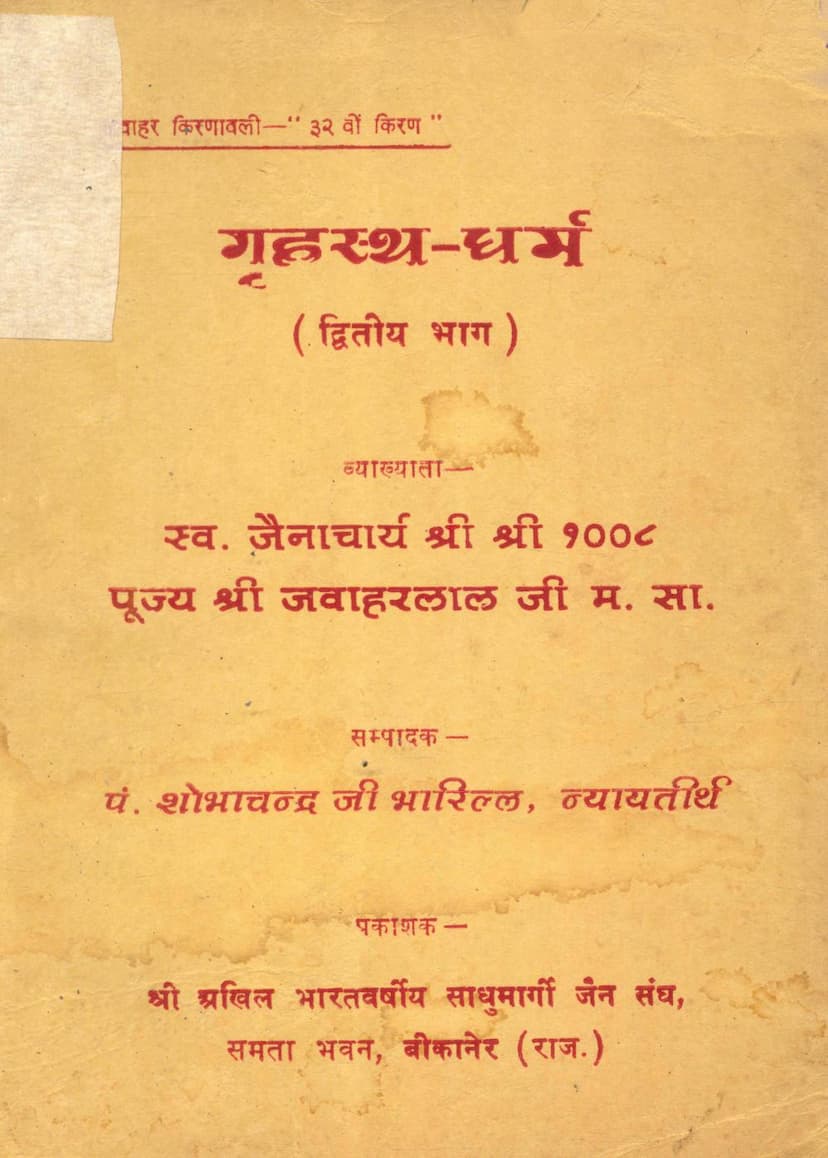Gruhastha Dharm Part 02
Added to library: September 1, 2025

Summary
This document is the second part of "Gruhastha Dharm" (The Dharma of a Householder), a Jain text. It is part of the "Jawahar Kiranavali" series, specifically the 32nd ray, and is a compilation of discourses by the late Jainacharya Shri Shri 1008 Pujya Shri Jawahar Lal Ji Maharaj, edited by Pandit Shobhachand Bharilla. The publisher is Shri Akhil Bharatvarshiya Sadhumargi Jain Sangh.
The book focuses on the ethical conduct and duties of a Jain householder. It elaborates on the core principles of Jainism as they apply to lay followers.
Key Themes and Chapters Covered:
-
Introduction and Publisher's Note: The initial pages highlight the significance of Acharya Jawahar Lal Ji's teachings, emphasizing their inspirational and transformative impact. The publisher expresses gratitude for the support in bringing out this volume.
-
The Importance of Knowledge and Action (Page 6-7): The text begins by stressing that true spiritual progress in Jainism lies in the attainment of the soul's inherent infinite potential by shedding all bonds. This is achieved through the combination of knowledge (understanding the path) and conduct (practicing it). It warns against knowledge without action, comparing it to knowing the path to a city but never embarking on the journey.
-
The Significance of Conduct (Charitra) (Page 8-10): The importance of righteous conduct (charitra) is paramount, distinguishing a true monk (Sadhu) from a householder (Shravak). It criticizes the modern tendency to consider oneself a Shravak simply by birth, without adhering to the vows. A true Shravak is defined by the adoption of vows (anuvratas) with right faith (samyakdarshan).
-
The Chapters of Gruhastha Dharm (Part 02): The book is structured into several key vows and duties for householders:
- Satyanaubrata (The Vow of Truth) (Page 16-72): This extensive section defines truth not just as speaking factually, but as speaking what is beneficial, truthful, and pleasant. It contrasts truth with falsehood, explaining its importance in upholding dharma, leading to spiritual progress, and its power to influence even nature and divine beings. It outlines the nuances of truth, including what constitutes "gross" and "subtle" falsehood, and the ethical considerations of even speaking unpleasant truths.
- Asteya Vrata (The Vow of Non-Stealing) (Page 88-118): This chapter defines stealing (steys or adatta-daan) broadly, encompassing not just physical theft but also taking what is not freely given through mind, speech, or body. It discusses the various forms of theft, the reasons behind it (greed, idleness), and the severe consequences. It highlights "civilized" forms of theft like cheating in business or illegal profiteering, which are also condemned.
- Brahmacharya Vrata (The Vow of Chastity/Celibacy) (Page 128-178): This section delves into Brahmacharya, defining it in its broader and subtler sense. It explains that true Brahmacharya involves control over all senses and the mind, not just physical abstinence. It highlights the immense power derived from practicing Brahmacharya, its role in spiritual development, and the devastating consequences of its misuse or absence, attributing many societal ills to "virya nash" (loss of vital essence). It discusses the importance of diet, contemplation, and controlling sensory impulses. It also touches upon the need for both men and women to observe principles of chastity and the societal implications of their absence.
- Parigraha Pariman Vrata (The Vow of Limited Possessions) (Page 265-348): This is a significant portion of the book, explaining the concept of "parigraha" (attachment or possession). It defines parigraha as any object or thought that leads to "mamata" (possessiveness) and binds the soul. It distinguishes between internal parigraha (like anger, pride, greed, delusion) and external parigraha (material possessions). The text emphasizes that true spiritual progress lies in detachment from all possessions. It details the harmful effects of excessive parigraha, linking it to unhappiness, conflict, and the cycle of birth and death. The vow of limited possessions is presented as a practical step for householders to gradually reduce their attachment to worldly things, setting limits on what they will acquire and desire.
-
Definition of Jain Vows and Their Transgressions (Aticharas): For each vow, the text likely details its specific transgressions (aticharas) that a householder must avoid to maintain the purity of the vow.
-
The Spirit of the Teachings: Throughout the book, there is a strong emphasis on the practical application of Jain principles in daily life. The discourses aim to inspire readers to live a more ethical, disciplined, and spiritually aware life as householders, contributing to their own well-being and the welfare of society.
The overall message is to guide householders towards a life of righteousness, moderation, and spiritual growth within their worldly responsibilities, following the path laid out by the Jain Tirthankaras.